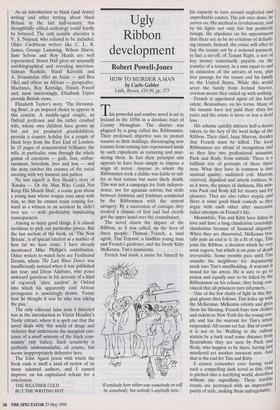Ugly Ribbon development
Robert Powell-Jones
HOW TO MURDER A MAN by Carlo Gebler Little, Brown, £16.99, pp. 373 This powerful and sombre novel is set in Ireland in the 1850s in a desolate tract of County Monaghan. The district was plagued by a gang called the Ribbonmen. Their professed objective was to protect tenants in their holdings, discouraging new tenants from coming into repossessed lands by such expedients as torturing and mur- dering them. In fact their principal aim appears to have been simply to impose a reign of terror. Anyone to whom the Ribbonmen took a dislike was liable to suf- fer at best torture but more likely death. This was not a campaign for Irish indepen- dence, nor for agrarian reform, but strife between Irishman and Irishman conducted by the Ribbonmen with the utmost savagery. By a succession of outrages they created a climate of fear and had clearly got the upper hand over the constabulary.
The novel charts the impact of the Ribbon, as it was called, on the lives of three people: Thomas French, a land agent, Tim Traynor, a landless young man and French's gardener, and the lovely Kitty McKenna, Tim's inamorata.
French had made a name for himself by Everybody here either was somebody or will be somebody, but nobody's anybody now.' his capacity to turn around neglected and unprofitable estates. The job once done, he moves on. His method is revolutionary, and by his lights not only fair but positively benign. He stipulates on his appointment that there are to be no evictions of default- ing tenants. Instead, the estate will offer to buy the tenant out by a notional payment, in fact a set-off, of Tenant Right, a sort of key money customarily payable on the transfer of a tenancy, in a sum equal to and in extinction of the arrears of rent, plus free passage for the tenant and his family to the United States. While this would sever the family from Ireland forever, eviction meant they ended up with nothing. French is appointed agent of the local estate, Beatonboro, on his terms. Many of the tenants have not paid their r6nts for years and the estate is more or less a dead loss.
His scheme quickly attracts half-a-dozen takers, to the fury of the local lodge of the Ribbon. Their chief, Isaac Marron, decides that French must be killed. The local Ribbonmen are afraid of recognition and so they hire two professional assassins, Puck and Rody, from outside. There is a brilliant trio of portraits of these three men. What they have in common is that unusual quality, undiluted evil. Marron, reserved, dignified and utterly ruthless, is, as it were, the prince of darkness. His mill- ions Puck and Rody kill for money and for pleasure. They are also rather stupid, and there is some good black comedy as they argue with each other after successive failed attempts on French's life.
Meanwhile, Tim and Kitty have fallen in love and have a long clandestine courtship, clandestine because of financial disparity. When they are discovered, McKenna bru- tally puts an end to it. In a fit of rage, Tim joins the Ribbon, a decision which he very soon regrets, but which is on pain of death irreversible. Some months pass until Tim assaults his neighbour for depasturing stock into Tim's smallholding. A warrant is issued for his arrest. He is sure to go to prison and equally sure to be killed by the Ribbonmen on his release, they being con- vinced that all prisoners turn informers.
One of the few shafts of light in this sty- gian gloom then follows. Tim holes up with the McKennas. McKenna relents and gives them his blessing. French buys new clothes and tickets to New York for the young cou- ple and has the warrant for Tim's arrest suspended. All seems set fair. But of course it is not to be. Walking to the railway station by a back road some distance from Beatonboro they are seen by Puck and Rody, who happen to be there, having Just murdered yet another innocent man. And that is the end for Tim and Kitty. I cannot remember ever having read such a compelling dark novel as this. One is pitched into a terrifying world, described without any superfluity. These terrible events are portrayed with an impeccable purity of style, making them unforgettable.


































































 Previous page
Previous page